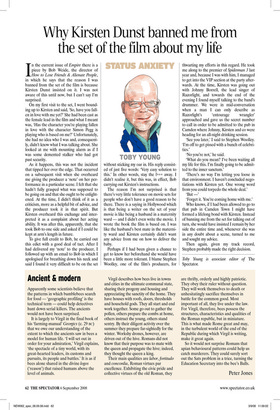Why Kirsten Dunst banned me from the set of the film about my life
In the current issue of Empire there is a piece by Bob Weide, the director of How to Lose Friends & Alienate People, in which he says that the reason I was banned from the set of the film is because Kirsten Dunst insisted on it. I was not aware of this until now, but I can’t say I’m surprised.
On my first visit to the set, I went bounding up to Kirsten and said, ‘So, have you fallen in love with me yet?’ She had been cast as the female lead in the film and what I meant was, ‘Has the character you’re playing fallen in love with the character Simon Pegg is playing who is based on me?’ Unfortunately, she had no idea who I was and, consequently, didn’t know what I was talking about. She looked at me with mounting alarm as if I was some demented stalker who had got past security.
As it happens, this was not the incident that tipped her over the edge. That occurred on a subsequent visit when she overheard me giving the producer a ‘note’ on her performance in a particular scene. I felt that she hadn’t fully grasped what was supposed to be going on and that she ought to be enlightened. At the time, I didn’t think of it as a criticism, more as a helpful bit of advice, and the producer took it in that spirit. But Kirsten overheard this exchange and interpreted it as a complaint about her acting ability. It was after this, apparently, that she took Bob to one side and asked if I could be kept at arm’s length in future.
To give full credit to Bob, he carried out this edict with a good deal of tact. After I had delivered my ‘note’ to the producer, I followed up with an email to Bob in which I apologised for breathing down his neck and said I found it very difficult to be on the set without sticking my oar in. His reply consisted of just five words: ‘Very easy solution to this.’ In other words, stay the f*** away. I didn’t realise it, but this was, in effect, Bob carrying out Kirsten’s instructions.
The reason I’m not surprised is that there’s very little tolerance on movie sets for people who don’t have a good reason to be there. There is a saying in Hollywood which is that being a writer on the set of your movie is like being a husband in a maternity ward — and I didn’t even write the movie. I wrote the book the film is based on. I was like the husband’s best mate in the maternity ward and Kirsten certainly didn’t want any advice from me on how to deliver the baby.
Perhaps if I had been given a chance to get to know her beforehand she would have been a little more tolerant. I blame Stephen Woolley, one of the film’s producers, for thwarting my efforts in this regard. He took me along to the premier of Spiderman 3 last year and, because I was with him, I managed to get into the VIP section at the party afterwards. At the time, Kirsten was going out with Johnny Borrell, the lead singer of Razorlight, and towards the end of the evening I found myself talking to the band’s drummer. We were in mid-conversation when a man I can only describe as Razorlight’s ‘entourage wrangler’ approached and gave us the secret number to call in order to be admitted to the pub in Camden where Johnny, Kirsten and co were heading for an all-night drinking session.
‘See you later,’ I said to Stephen Woolley. ‘I’m off to get pissed with a bunch of celebrities.’ ‘No you’re not,’ he said.
‘What do you mean? I’ve been waiting all my life for this. I’m finally going to be admitted to the inner sanctum.’ ‘There’s no way I’m letting you loose in that environment. I haven’t concluded negotiations with Kirsten yet. One wrong word from you could torpedo the whole deal.’ ‘But —’ ‘Forget it. You’re coming home with me.’ Who knows, if I had been allowed to go to that pub in Camden Town I might have formed a lifelong bond with Kirsten. Instead of banning me from the set for talking out of turn, she would have insisted I remain by her side the entire time and, whenever she was in any doubt about a scene, turned to me and sought my advice.
Then again, given my track record, Stephen probably made the right decision.
Toby Young is associate editor of The Spectator.


































































 Previous page
Previous page